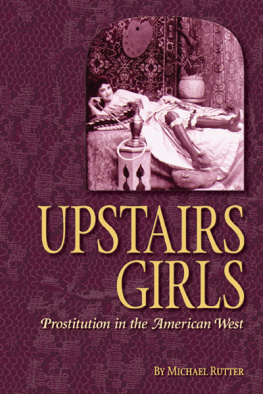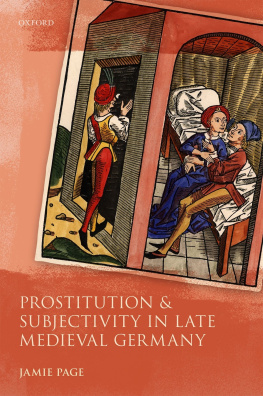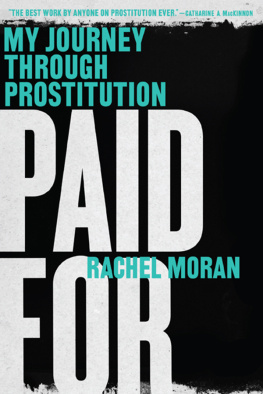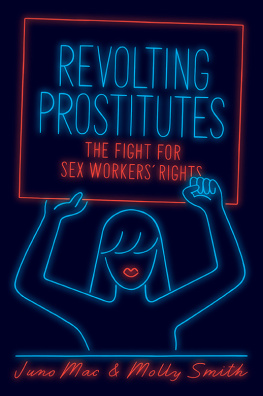Thank you for buying this ebook, published by NYU Press.
Sign up for our e-newsletters to receive information about forthcoming books, special discounts, and more!
Sign Up!
About NYU Press
A publisher of original scholarship since its founding in 1916, New York University Press Produces more than 100 new books each year, with a backlist of 3,000 titles in print. Working across the humanities and social sciences, NYU Press has award-winning lists in sociology, law, cultural and American studies, religion, American history, anthropology, politics, criminology, media and communication, literary studies, and psychology.
LEAVING PROSTITUTION
NEW YORK UNIVERSITY PRESS
New York and London
www.nyupress.org
2014 by New York University
All rights reserved
References to Internet websites (URLs) were accurate at the time of writing. Neither the author nor New York University Press is responsible for URLs that may have expired or changed since the manuscript was prepared.
Library of Congress Cataloging-in-Publication Data
Oselin, Sharon S.
Leaving prostitution : getting out and staying out of sex work / Sharon S. Oselin.
pages cm
Includes bibliographical references and index.
ISBN 978-0-8147-8588-1 (cloth : alk. paper)
ISBN 978-0-8147-7037-5 (pbk. : alk. paper)
1. Prostitution--United States. 2. Prostitutes--Rehabilitation--United States. 3. Prostitutes--Services for--United States. I. Title.
HQ144.O84 2014
363.440973--dc23
2013045556
New York University Press books are printed on acid-free paper, and their binding materials are chosen for strength and durability. We strive to use environmentally responsible suppliers and materials to the greatest extent possible in publishing our books.
Manufactured in the United States of America
c 10 9 8 7 6 5 4 3 2 1
p 10 9 8 7 6 5 4 3 2 1
Also available as an ebook
ACKNOWLEDGMENTS
First and foremost, I sincerely thank the women immersed within these prostitute-serving organizations (PSOs) who made this book possible. Most were very receptive to my presence and eagerly participated in this research project. Despite the magnitude of their own challenges and struggles, they took time to speak with me, candidly revealed their experiences (even traumatic and painful ones), and divulged extremely personal information to a virtual stranger. That in and of itself took courage and strength. I applaud the fortitude these individuals exhibited during their transition off the streets, as the foray into the unchartered territory of a new life is a daunting task.
I must also acknowledge the generosity of the PSOs and their staff members who allowed me access to conduct research at their respective programs. Not only did these staff members treat me with kindness and respect, they freely offered their time to answer my questions, showed me around, and supported my study in a myriad of ways. In particular, I want to thank Denise H. for being so hospitable to me during my fieldwork. Overall, I admire how deeply invested the staff members are in the well-being and success of those they serve. It was extremely touching to witness.
My first sociological mentor, Michael Skladany, inspired me by his enthusiastic teaching while at Michigan State University. I may not have made it to graduate school without his encouragement. The support, guidance, and intellect of my advisors and colleagues helped vastly improve this project at each stage along the way. The academic work of my advisors at the University of California, Irvine exemplified high-quality and compelling sociological research, which set the bar for performance quite high. In particular, I thank David Snow for challenging me to become a more thoughtful sociologist, for posing hard questions about my work when needed, and for his unwavering faith in this project and my ability to successfully complete it. Calvin Morrill likewise provided support for this project, showed consistent enthusiasm about it, and regularly brainstormed ideas with me in his office. I always trusted Valerie Jenness to give honest feedback about my work, which was invaluable, and she always managed to do so in a constructive manner. I sought her out for practical advice on countless occasions and I appreciate her willingness to do so. Finally, Jennan Ghazal Read showed me how to code, analyze, and write up qualitative data, and was readily available to dispense guidance and suggestions when asked. I would not possess the skill set I have today, integral to this project and book, without the help of these mentors.
Fellow scholars of sex work Ron Weitzer, Barb Brents, and Jody Miller have read and commented on ideas in this book and various portions of it. They candidly shared their experiences with book publishing, their proposals, and offered counsel throughout this process. I am very grateful for their support.
Many colleagues and friends have provided emotional support and encouragement over the years, including Goldie Komaie, Steve Boutcher, Becky Trammell, Christine Oh, Danielle Rudes, Yuki Kato, and Kelsy Kretschmer. I will never forget the countless coffees, lunches, and conversations that sustained me and spurred me on to complete this book. Catherine Corrigall-Brown, Jody Agius Vallejo, and Katja Guenther were especially helpful by sharing their experiences with book publishing, providing useful tips, and overall reminding me of the value of my work and its contribution. I appreciate all my colleagues at California State University, Los Angeles, who expressed interest in my book and who work so hard to build our department and better serve our students. Elaine Draper, in particular, was a relentless cheerleader of this book, even long before its acceptance.
I received financial support from UC Irvines Center for Organizational Research (COR), UC Irvine, CSU Los Angeles, and the American Association of University Women (AAUW) that enabled me to conduct fieldwork in various cities and to analyze and write portions of this manuscript. This monetary and symbolic support encouraged me and motivated me over the years.
I appreciate the hard work of the NYU editors, and especially Ilene Kalish, for believing in this project and walking me through the publishing process. I thank the anonymous reviewers for their time and recommendations for improvement. Altogether, their thoughtful feedback and comments on various drafts vastly improved the quality of the manuscript.
Many of my dear family members and friends encouraged my work and career in so many small and large ways. They continue to bring much joy into my life, and for that I am grateful. I feel so fortunate for my friend Heather, who is also an academic. Weve come a long way together over the years. Jamie is always one of the first people to sing my praises and point out my accomplishments. Jennifer distracts me with amusing stories that bring a smile to my face. Amanda, Diane, and Veronica help me be the person I strive to be. John and Elaine Novak are the coolest and most generous relatives one could ask for, and Rich, Karen, and Nolan Oselin enrich my life by their very existence.
I am lucky to have such amazing parents, who have been relentless supporters, both emotionally and financially, over the years. They taught me an ethic of hard work and to be generous and gracious to others. I cannot adequately express my gratitude for Matthew, who distracted me when I needed it most, read various drafts of this book, and provided another perspective when I was stuck in a rut. I am beyond thankful for his adventurous spirit, keen intellect, love, and unwavering support.







